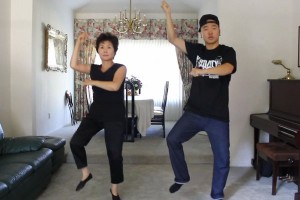December 4th, 2012 by admin in Health Tips, Humor, Research
No Comments »
 In my last post I told you that I would reveal the one thing you can do to have a significant, positive and lasting effect on your brain health as you get older. See if you can spot it in the following list:
In my last post I told you that I would reveal the one thing you can do to have a significant, positive and lasting effect on your brain health as you get older. See if you can spot it in the following list:
a) Learn to dance Gangnam style
b) Join a choir
c) Catch a wave
d) Pump some iron
Ok, that was a trick question. All of these answers are somewhat correct, but I was looking for the “most” correct answer (flashbacks to undergrad, anyone?): Pump some iron.
I realize I sound like a broken record – I’ve already written about how aerobic exercise can promote healthy aging here and here, and I’ve even already written about resistance training, or lifting weights, here.
So why am I at it again? Because it’s important!
I’m fresh out of the 2012 Aging and Society Conference, where researchers came together to discuss what works and what doesn’t when it comes to healthy aging. It turns out everyone pretty much agrees that exercise is hands down the most effective intervention to keep your brain cells happy into old(er) age. All sorts of different types of exercise, ranging from simply walking to attending resistance training classes, are associated with different types of improvements in cognition, memory, and even brain size.
Of course, there are different levels of effort involved with different types of exercise, or even when talking about a single form of exercise. When my friend Jess asks me to go for a walk, she means a power walk: it usually involves going up hills, sweating like a pig (even though pigs, ironically, don’t sweat much), and barely having enough breath for girl talk (though somehow we always seem to find it). When my friend Al and I go for a walk, what he means is a “mosey”: we stop to look at the view, pet the dog, chit chat with strangers, and have more than enough breath for lengthy discussions about life, work, and the possibility of alien lifeforms. When it comes to brain health, whether you’re walking or pumping iron, a little sweating and effort can go a long way. For example, resistance training has been proven to be most effective when the load, or how much weight you are working with, increases over time. So kick the intensity up a notch: there will still be plenty of time for chit chat around a post-exercise, antioxidant-rich mug of matcha (my new obsession – stay tuned).
Now that the obvious has been (re)stated, I want to take this opportunity to discuss the idea that perhaps lifestyle interventions such as exercise could be prescribed by your doctor. We know that exercise can improve cognition in aging but also conditions like depression. Should physicians prescribe lifestyle changes? Or are diet, exercise, and other lifestyle activities choices we should make ourselves? How would you feel if your doctor prescribed you exercise instead of pills? Would you be more motivated to exercise if the prescription came from your doctor instead of from your friendly Internet science blogger? Your thoughts in the comments!
***
Dr. Julie Robillard is a neuroscientist, neuroethicist and science writer. You can find her blog at scientificchick.com.
November 15th, 2012 by admin in Health Tips
No Comments »
 Can we “train” our brains to be brighter, sharper, faster?
Can we “train” our brains to be brighter, sharper, faster?
A while back I wrote a post about a big study looking at “brain training”. The researchers wanted to know whether training programs that look like video games (like Brain Age andLumosity) could significantly improve brain performance on various tests. The results, in a nutshell, showed that while participants improved on the tasks they trained on (e.g., if the game involved ranking balls from smallest to biggest, the participants got *really* good at ranking balls from smallest to biggest), the improvement didn’t carry over to general brain function.Turns out ranking ball sizes doesn’t help you remember where you left your keys this morning.
Two years later, what’s the word?
I’m going to shift a little from how I normally do things (review a single article) and tell you about findings I learned about at the recent Aging and Society conference. At the conference, several researchers talked about brain training in the context of aging. We know that as we get older our cognitive abilities decline – we forget names and words, misplace our shopping lists, and process information a little bit more slowly. Wouldn’t it be fantastic if we could just spend ten minutes a day playing games on our iPad and successfully counter this decline? Of course it would be fantastic. Not just for us, but also for the companies who are trying very hard to convince us to buy their products to improve our cognition.
The problem is that skills are specific. If you want to become a fabulous jazz pianist, you have to play the piano (preferably jazz songs, too). If you want to become a star ballet dancer, you have to practice ballet. If you want to become a better mountain biker, you have to mountain bike – road biking will improve your leg strength and fitness, but ultimately it won’t make you a better mountain biker. So why should things be any different for brain skills?
As it turns out, they aren’t. Two years later, nearly all the research conducted in the field of brain training is turning up the same results: people only get better at the tasks they trained on – the improvement doesn’t cross over to more general skills, different skills, or everyday life. In one study, a researcher compared a commercially available brain training program with what she called an “active control” – a group that simply played regular video games like Tetris. She found that the group who spent time on the commercially available brain training program actually saw some aspects of their cognition decline compared with the control group. Bummer.
Now don’t throw out your Brain Age game yet – everyone at the conference agreed that engaging your brain in training programs is better than not doing anything. And most of the researchers felt that while the programs don’t work now, it’s not to say they’ll never work. We are increasingly more knowledgeable about how the brain works, what happens when we get old, and what different training tasks do. So it’s quite possible that sometime in the near-ish future (don’t ask me when) we could see the advent of brain training programs that do have a significant and lasting impact on cognition.
Until then, there is one thing you can do to have a significant and lasting impact on your brain health… And I’ll tell you in the next post.
***
Dr. Julie Robillard is a neuroscientist, neuroethicist and science writer. You can find her blog at scientificchick.com.
November 27th, 2011 by Medgadget in Research
No Comments »

 Embryonic stem cells have the potential to treat a range of diseases and conditions for which current treatment options are lacking. Capable of differentiating practically into all of the types of tissues in the human body, the cells could be used in therapies to treat conditions such as paralysis, brain damage, and Parkinson’s disease. Among the many challenges to be overcome before human embryonic stem cells live up to their promise is difficulty in proving whether transplanted stem cells can integrate successfully in vivo.
Embryonic stem cells have the potential to treat a range of diseases and conditions for which current treatment options are lacking. Capable of differentiating practically into all of the types of tissues in the human body, the cells could be used in therapies to treat conditions such as paralysis, brain damage, and Parkinson’s disease. Among the many challenges to be overcome before human embryonic stem cells live up to their promise is difficulty in proving whether transplanted stem cells can integrate successfully in vivo.
Researchers from University of Wisconsin-Madison have announced progress on that front. Having created Read more »
*This blog post was originally published at Medgadget*
October 10th, 2011 by Steve Novella, M.D. in Opinion, Research
No Comments »

While we frequently on SBM target the worst abuses of science in medicine, it’s important to recognize that doing rigorous science is complex and mainstream scientists often fall short of the ideal. In fact, one of the advantages of exploring pseudoscience in medicine is developing a sensitive detector for errors in logic, method, and analysis. Many of the errors we point out in so-called “alternative” medicine also crop up elsewhere in medicine – although usually to a much less degree.
It is not uncommon, for example, for a paper to fail to adjust for multiple analysis – if you compare many variables you have to take that into consideration when doing the statistical analysis, otherwise the probability of a chance correlation will be increased.
I discussed just last week on NeuroLogica the misapplication of meta-analysis – in this case to the question of whether or not CCSVI correlates with multiple sclerosis. I find this very common in the literature, essentially a failure to Read more »
*This blog post was originally published at Science-Based Medicine*
July 1st, 2011 by Berci in News
No Comments »

 Did you know that Natalie Portman (under the name, Natalie Hershlag) published a paper in a scientific journal in 2002 while at Harvard?
Did you know that Natalie Portman (under the name, Natalie Hershlag) published a paper in a scientific journal in 2002 while at Harvard?
Frontal lobe activation during object permanence: data from near-infrared spectroscopy.
The ability to create and hold a mental schema of an object is one of the milestones in cognitive development. Developmental scientists have named the behavioral manifestation of this competence object permanence. Convergent evidence indicates that frontal lobe maturation plays a critical role in the display of object permanence, but methodological and ethical constrains have made it difficult to collect neurophysiological evidence from awake, behaving infants. Near-infrared spectroscopy provides a noninvasive assessment of changes in oxy- and deoxyhemoglobin and total hemoglobin concentration within a prescribed region. The evidence described in this report reveals that the emergence of object permanence is related to an increase in hemoglobin concentration in frontal cortex.
*This blog post was originally published at ScienceRoll*
 In my last post I told you that I would reveal the one thing you can do to have a significant, positive and lasting effect on your brain health as you get older. See if you can spot it in the following list:
In my last post I told you that I would reveal the one thing you can do to have a significant, positive and lasting effect on your brain health as you get older. See if you can spot it in the following list:

 Can we “train” our brains to be brighter, sharper, faster?
Can we “train” our brains to be brighter, sharper, faster?
 Embryonic stem cells have the potential to treat a range of diseases and conditions for which current treatment options are lacking. Capable of differentiating practically into all of the types of tissues in the human body, the cells could be used in therapies to treat conditions such as paralysis, brain damage, and Parkinson’s disease. Among the many challenges to be overcome before human embryonic stem cells live up to their promise is difficulty in proving whether transplanted stem cells can integrate successfully in vivo.
Embryonic stem cells have the potential to treat a range of diseases and conditions for which current treatment options are lacking. Capable of differentiating practically into all of the types of tissues in the human body, the cells could be used in therapies to treat conditions such as paralysis, brain damage, and Parkinson’s disease. Among the many challenges to be overcome before human embryonic stem cells live up to their promise is difficulty in proving whether transplanted stem cells can integrate successfully in vivo.

 Did you know that
Did you know that 







